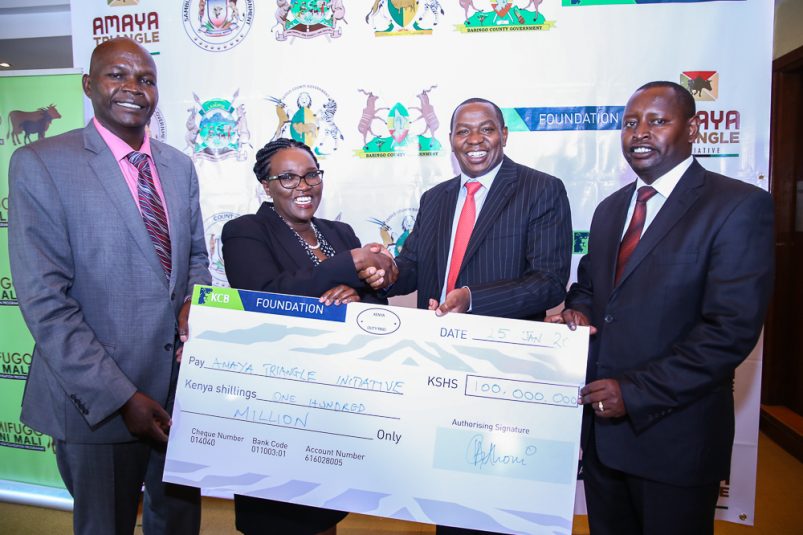KCB Foundation has teamed up with Baringo, Isiolo, Laikipia and Samburu counties to support livestock value chain development enterprises in the four counties.
KCB Foundation has partnered with four County Governments to support the livestock sub-sector in Kenya to shore up output and create new jobs.
The deal signed on Friday, 26 January 2018 will bring on board the four counties — Baringo, Isiolo, Laikipia and Samburu — under the auspices of a newly formed economic bloc dubbed ‘The Amaya Triangle Initiative’.

The Amaya Counties and the Foundation have pooled funds for joint livestock marketing and production initiatives, an arrangement that has so far received Kshs 100 million from KCB Foundation. The monies will go towards supporting livestock value chain development enterprises in the four counties.
Under the partnership, the KCB Foundation will facilitate credit provision towards productivity, breeding, nutrition, value addition, disease management, business development and market access initiatives for livestock keepers in meat value chains. It will also support extension services for livestock keepers.
“We will want to boost market access and productivity for the livestock value chain players in a bid to increase the contribution of the livestock sector to the national economy,” said KCB Foundation Executive Director Jane Mwangi. “This will strengthen husbandry and animal management for livestock farmers through enhanced capacity building and promotion of innovative fodder management, including use of the soil-less hydroponic farming technology,” she added. The Foundation will support mobilisation of livestock keepers and livestock value chain actors into cooperatives and strengthen the cooperatives’ governance and management structures and processes.
Further, the Foundation will promote financial inclusion through support of business development, capital assets acquisition and operational expenses for commercialisation of the livestock value chain through interest free loans. It will also train livestock farmers on business management. Part of the funding will be utilised in supporting youth-run enterprises under the Foundation’s 2jiajiri programme.
On their part, the four counties will provide extension services and capacity building to participating cooperatives for animal health, disease and pest management, animal husbandry, breeding, nutrition and related services. “We are all united in our commitment to improving the lives of area residents through sustainable development of the livestock sub-sector whose potential is yet to be fully exploited,” said Laikipia Governor Ndiritu Muriithi.
The counties will also mobilise members of livestock ranches for the project and spearhead the establishment of similar groupings in the livestock sub-sector.
“As a bloc, we want to invest in livestock as there is a huge potential in the sector; all that is needed is to step up efforts to open up markets, streamline animal feeding and disease control,” said Samburu Governor Moses Lenolkulal.
The Amaya Triangle will support the livestock keepers and livestock value chain actors to secure markets for their livestock and livestock produce.
“Resources are limited, they will always be limited, but when we pull together and create some synergy we will grow our region”, said Baringo Governor Stanley Kiptis.
The KCB Foundation Executive Director said the Foundation will work closely with the four counties towards controlling livestock theft and management of livestock products quality through the livestock traceability and identification system using the Radio Frequency Identification (RFID) microchips technology in Arid and Semi-Arid counties.
“We are already championing the use of RFIDs especially in Kenya’s Arid and Semi-Arid Areas (ASALs) through the Mifugo Ni Mali programme ran by the KCB Foundation and the MobiGrow programme in piloting the tagging of 40,000 cattle in the ASAL counties,” said Ms Mwangi.
Isiolo Governor Dr Mohamed Kuti said: “I would like to confirm our support, our engagement and full participation as Isiolo County because of the necessity and familiarity of challenges that face our four counties”.




